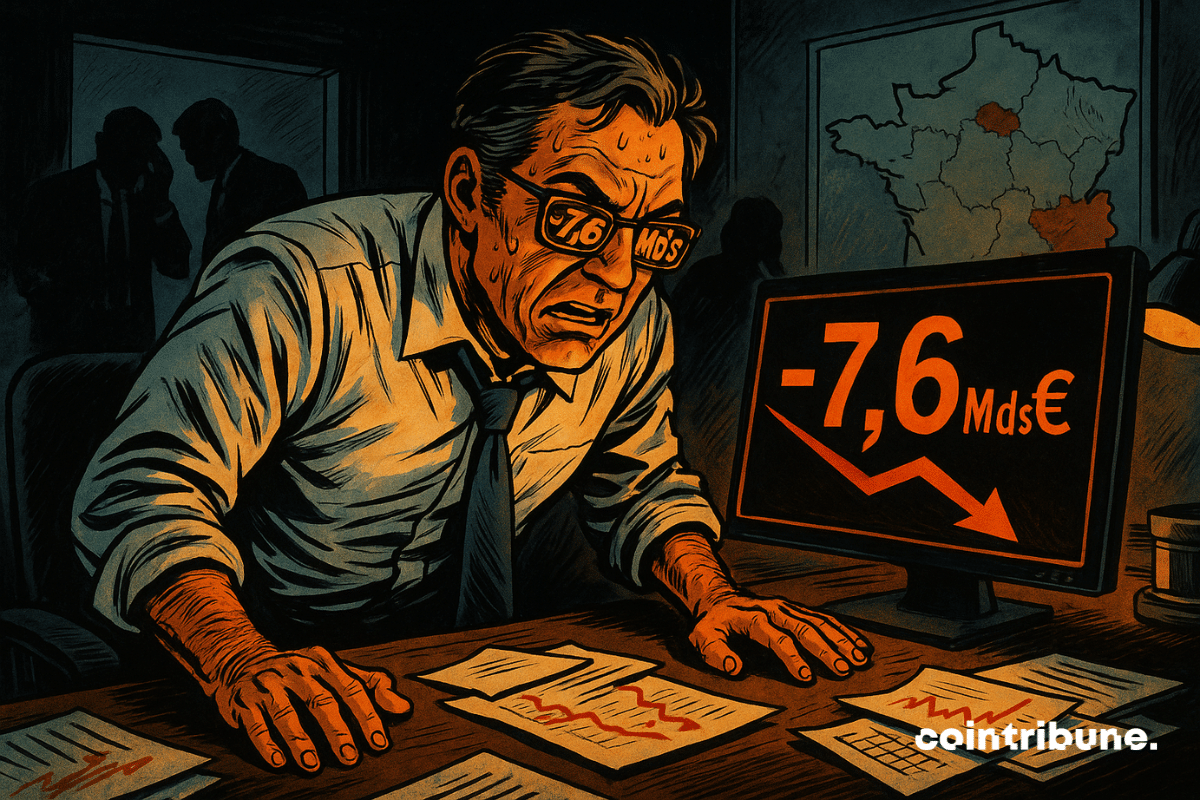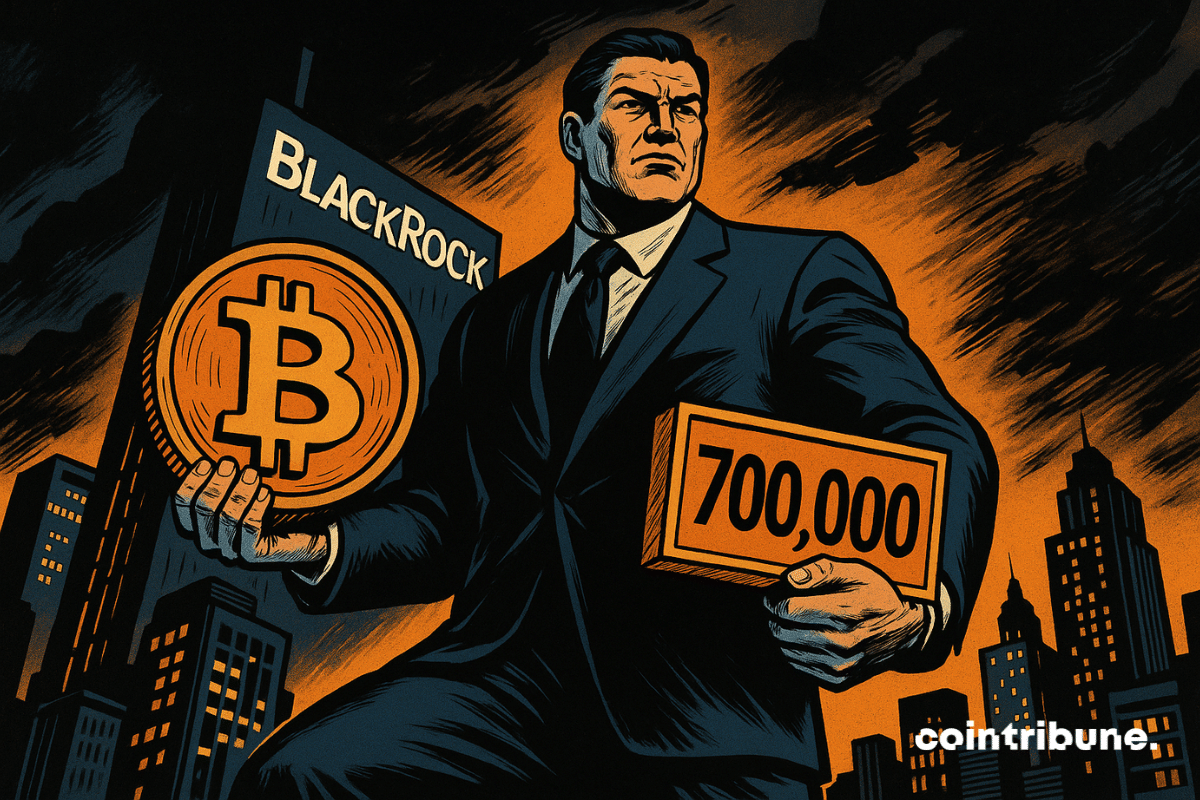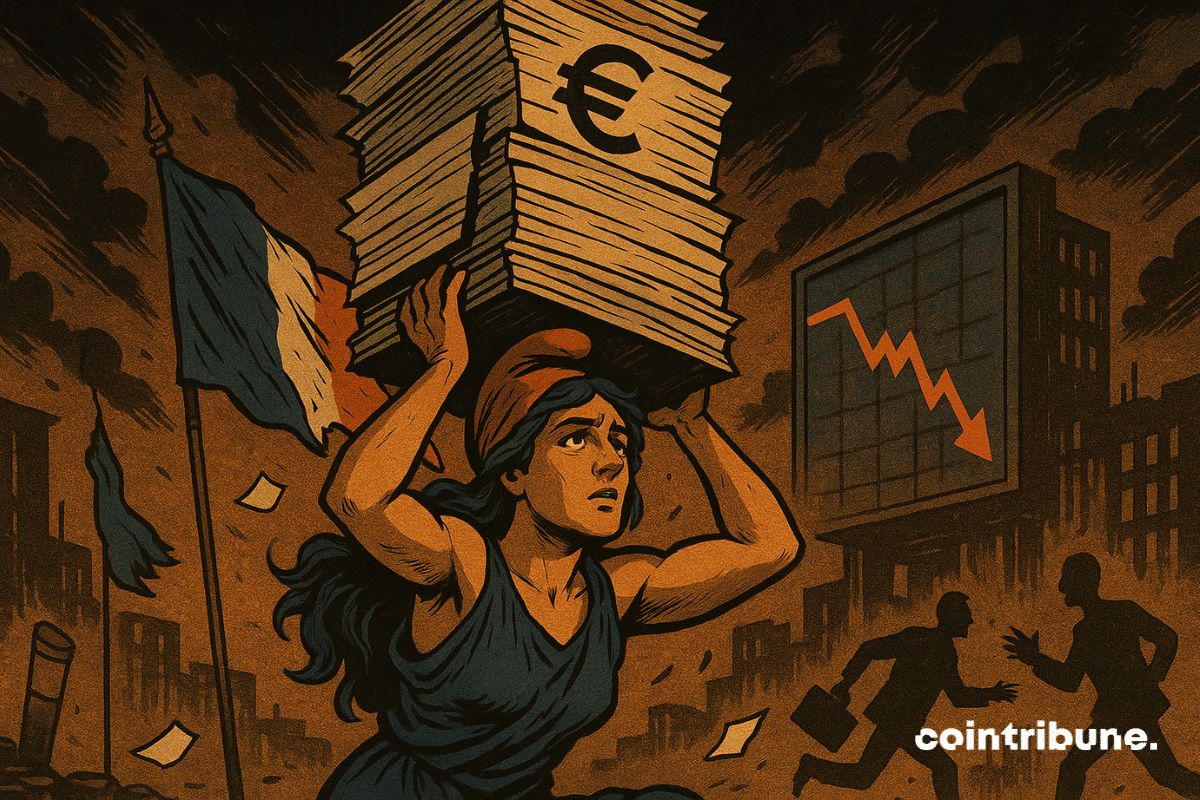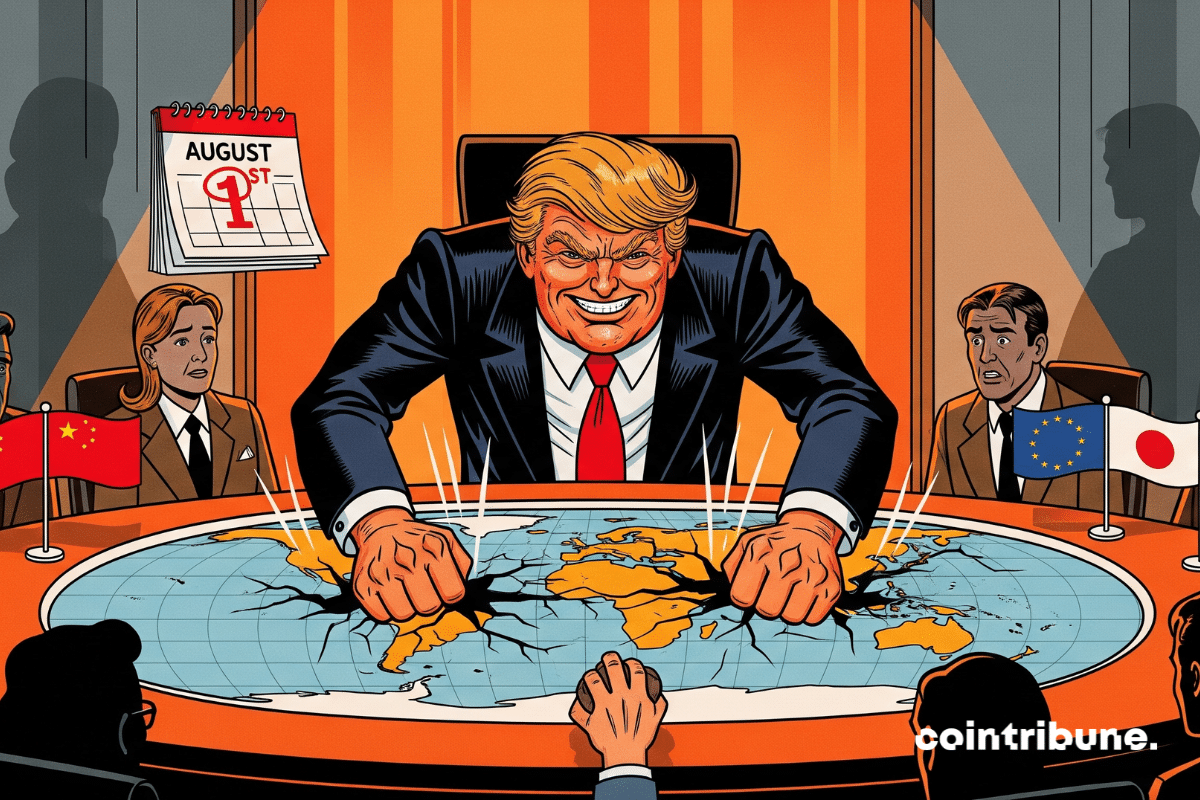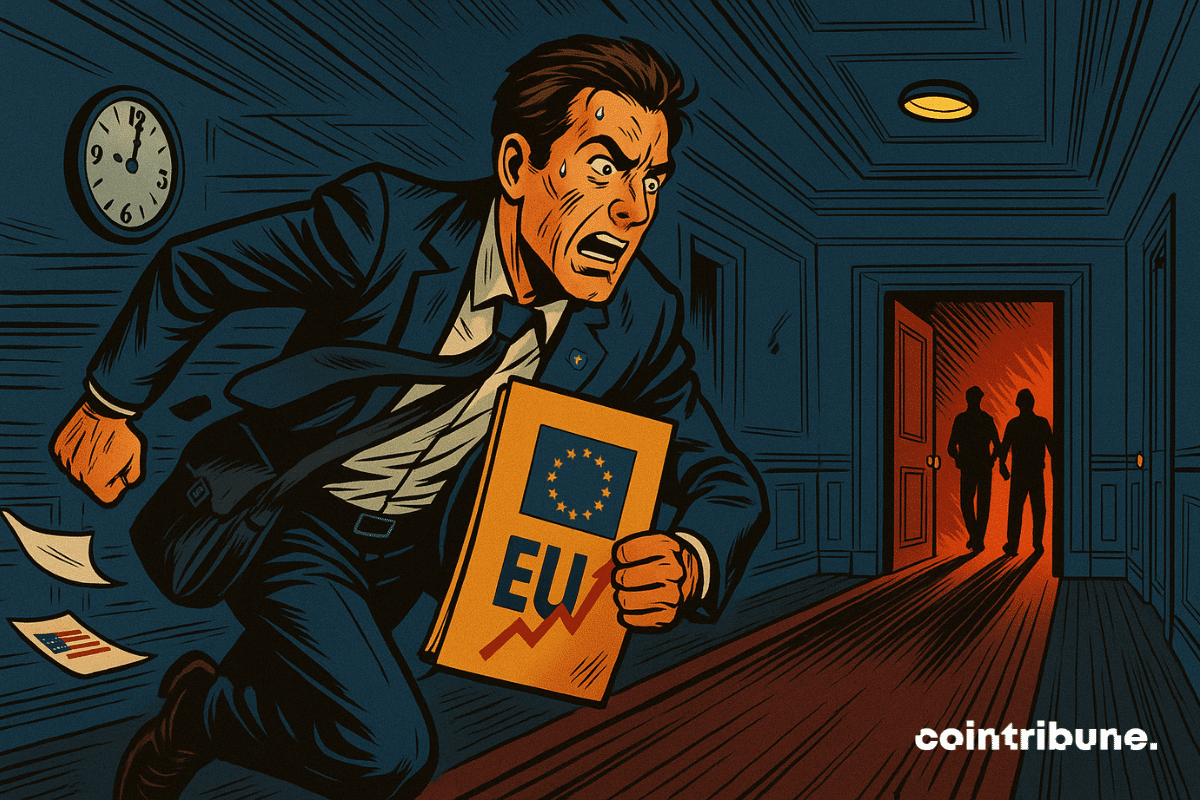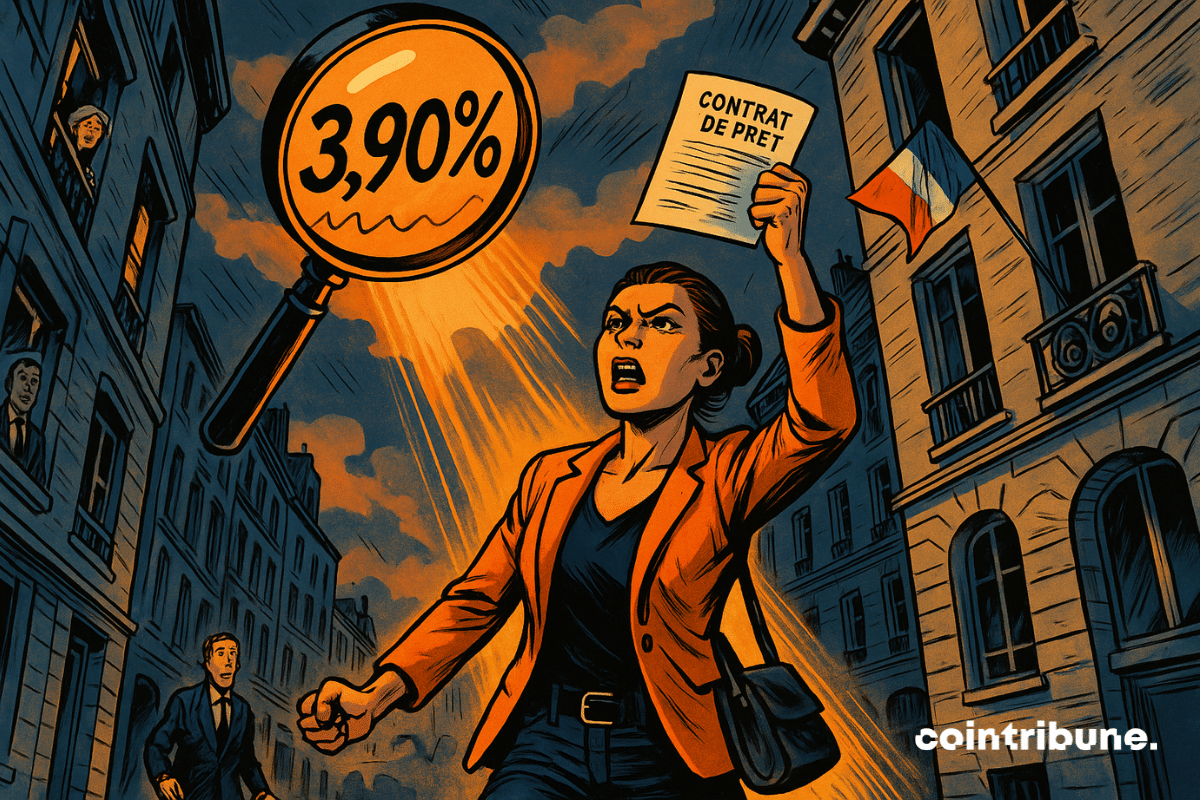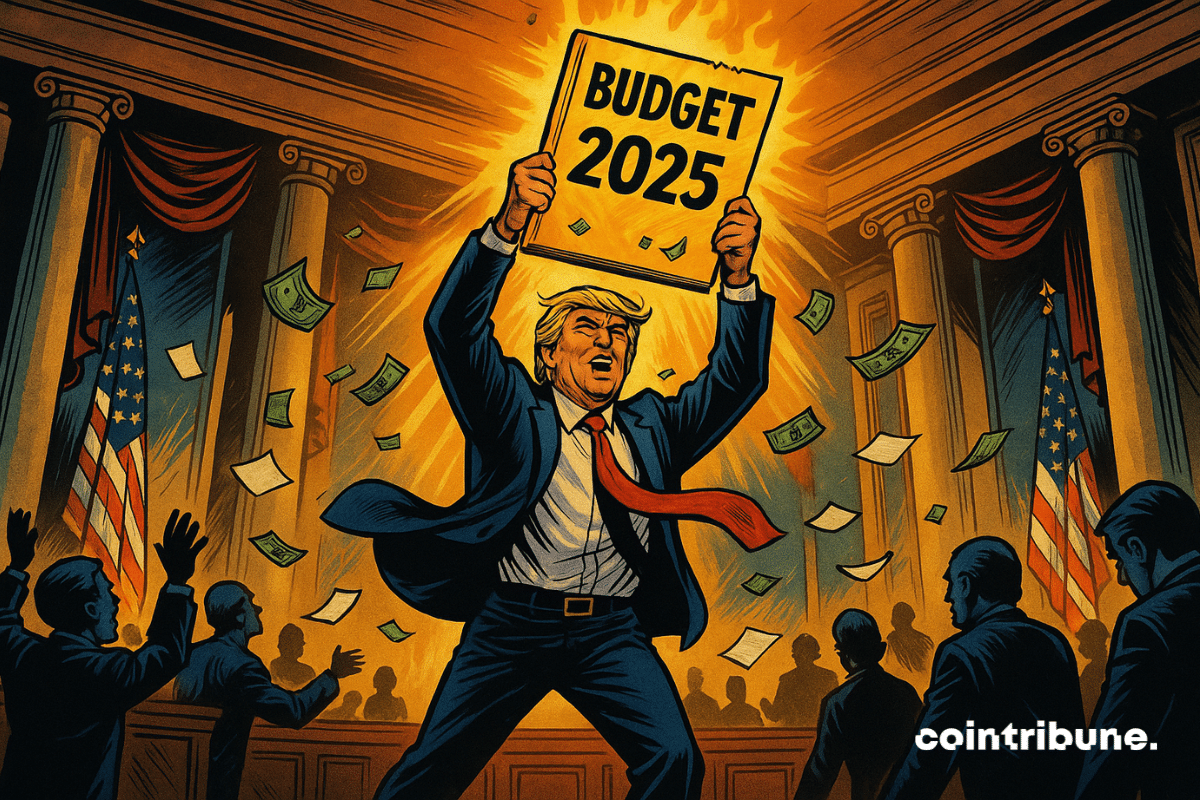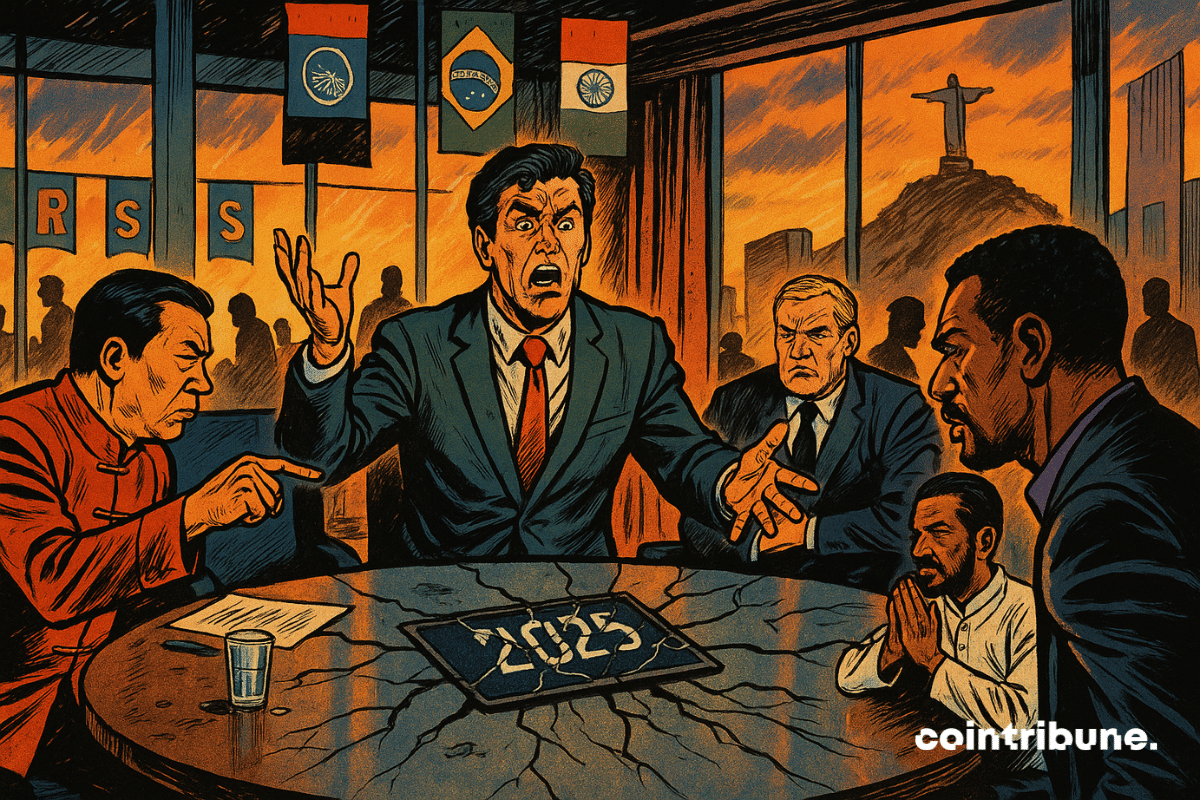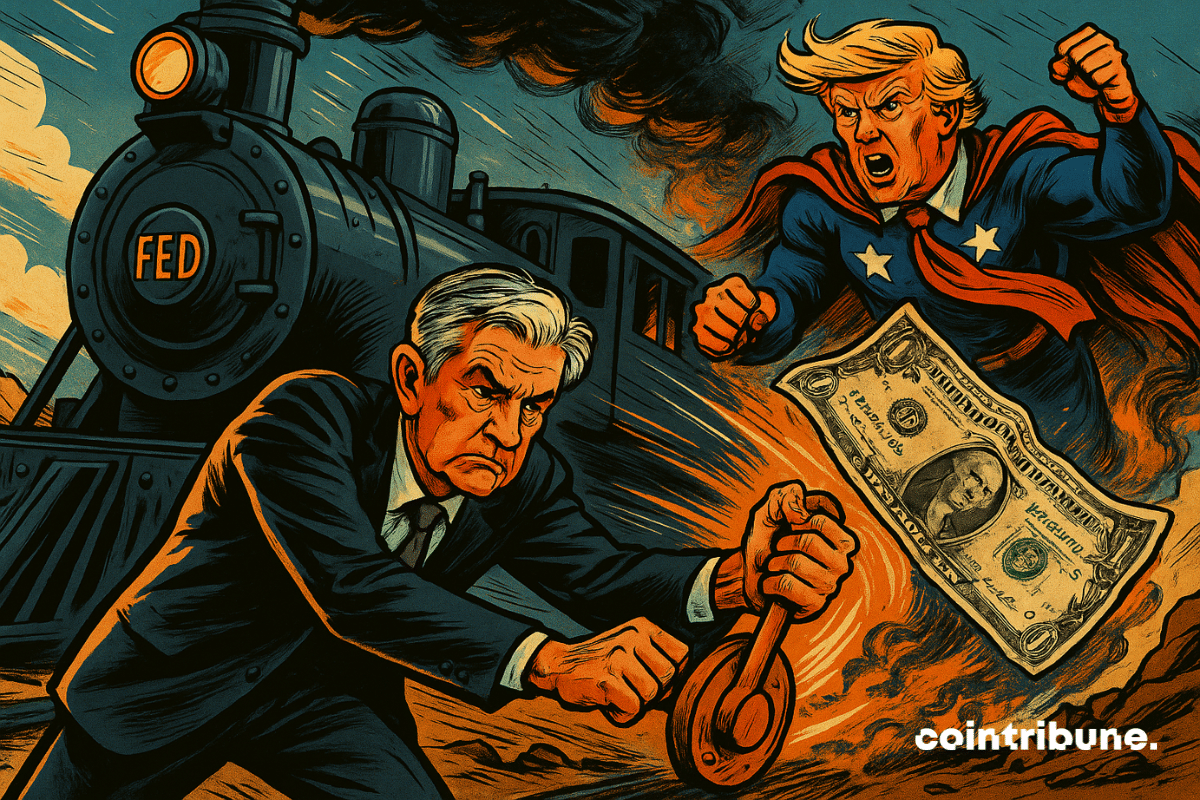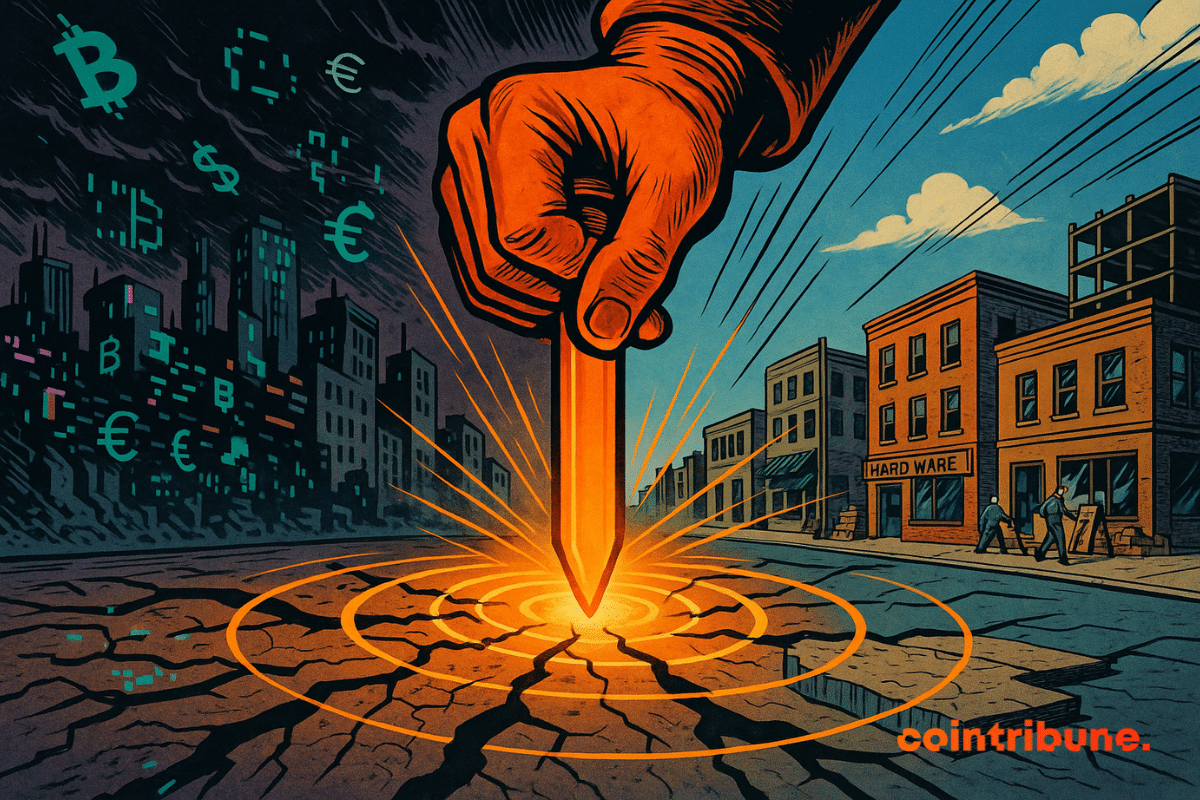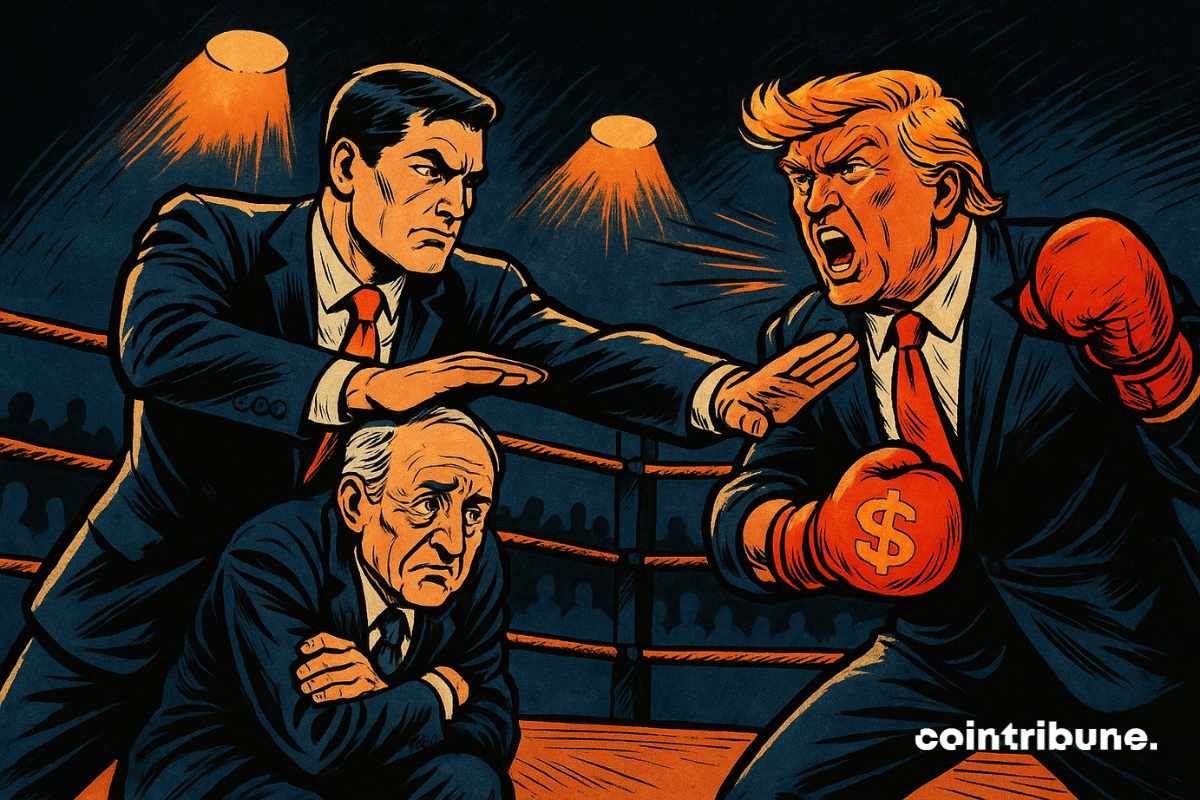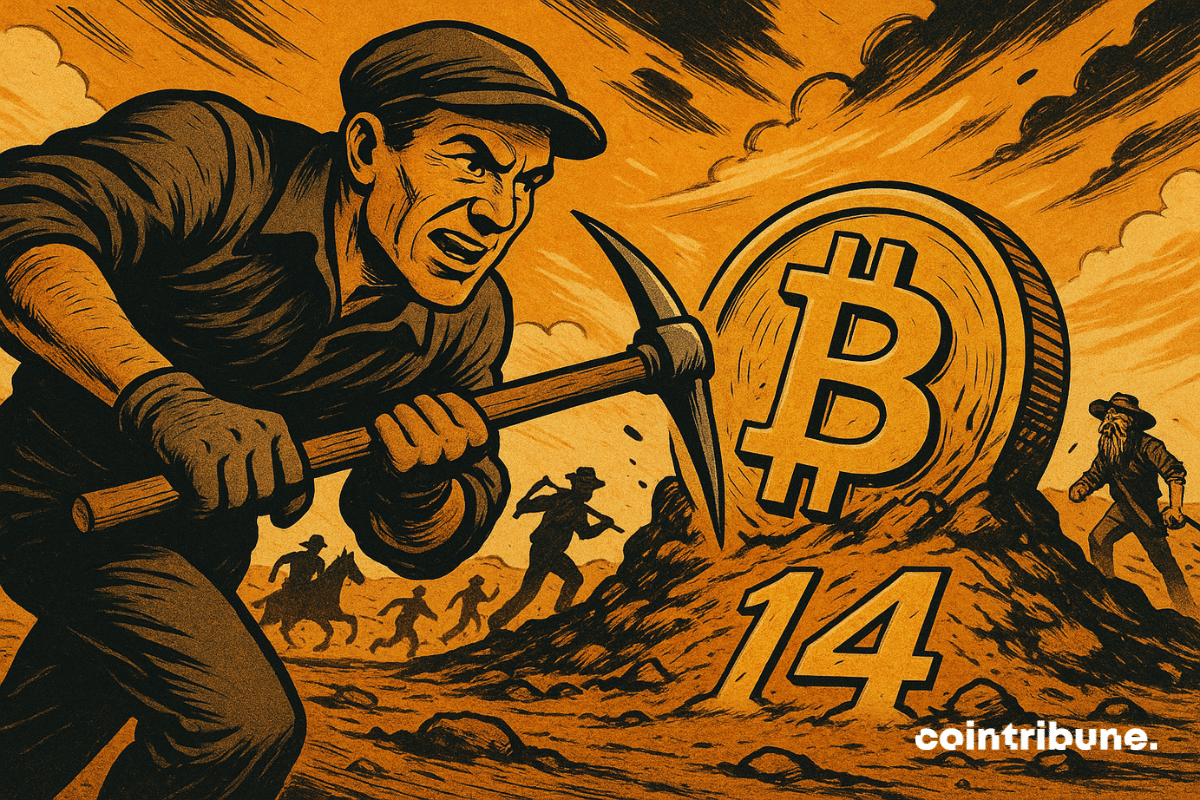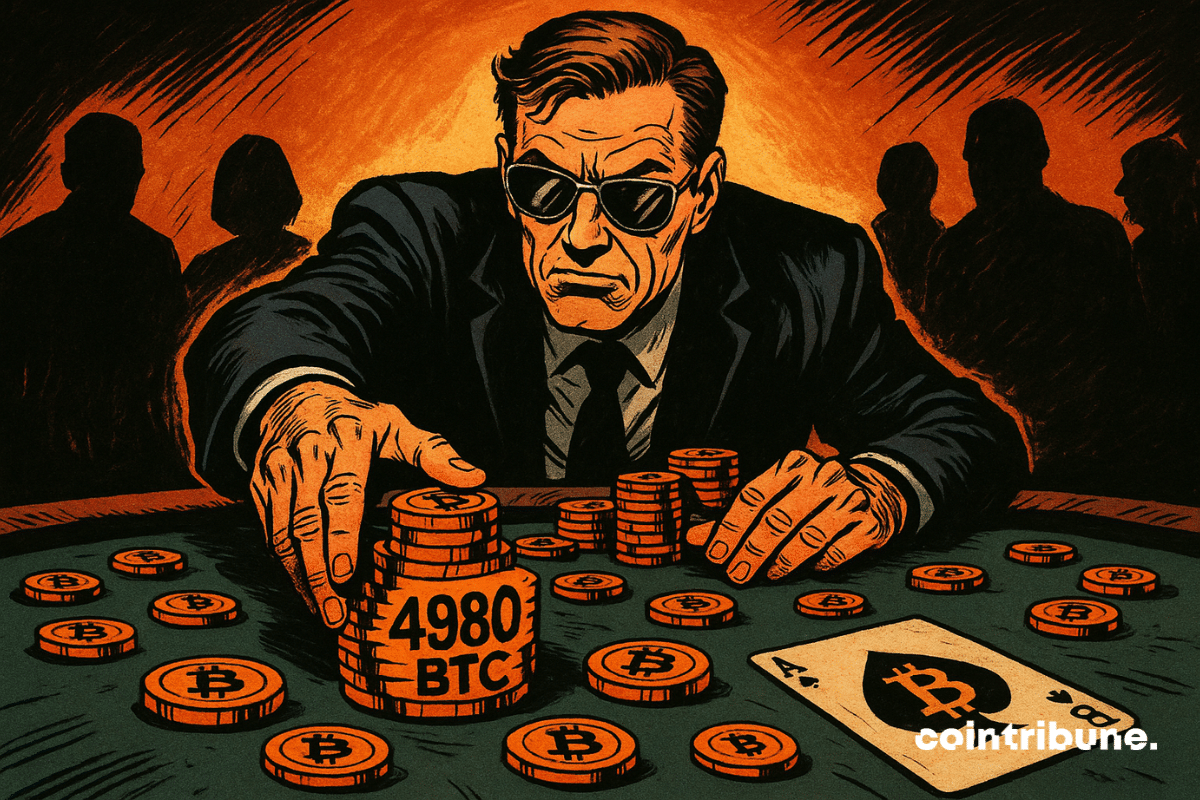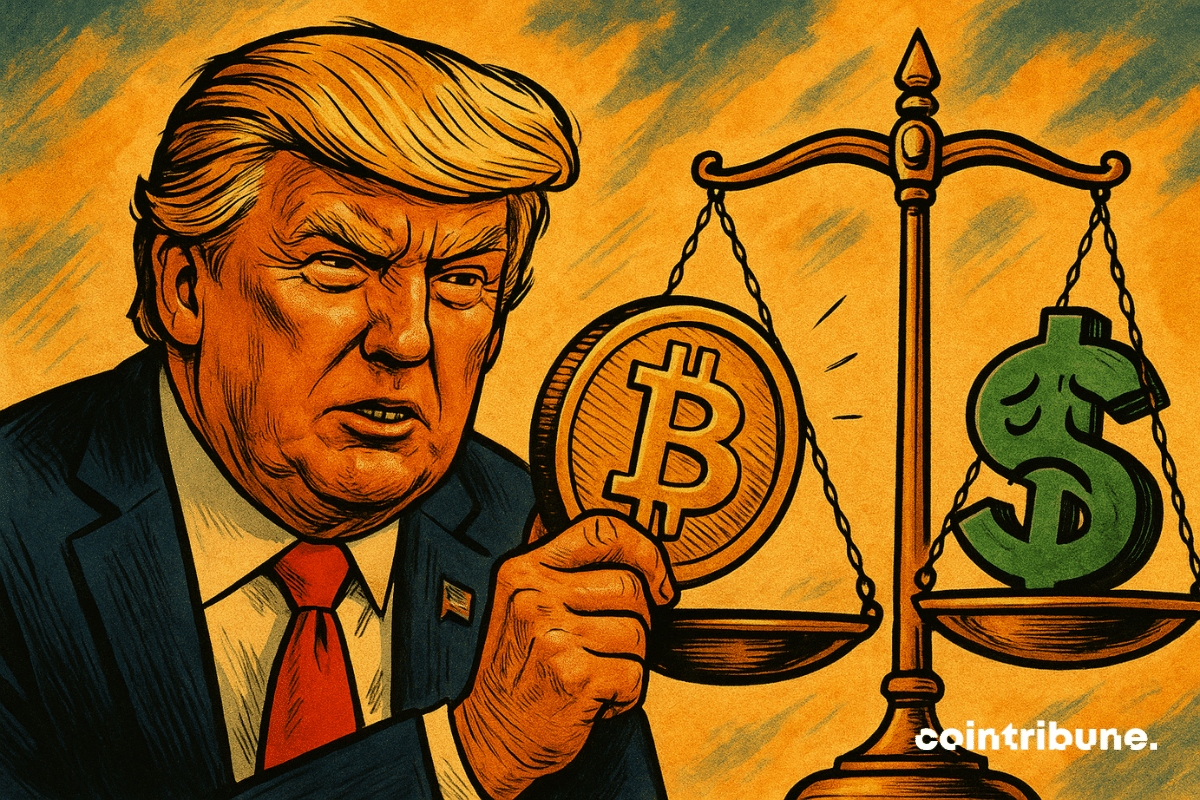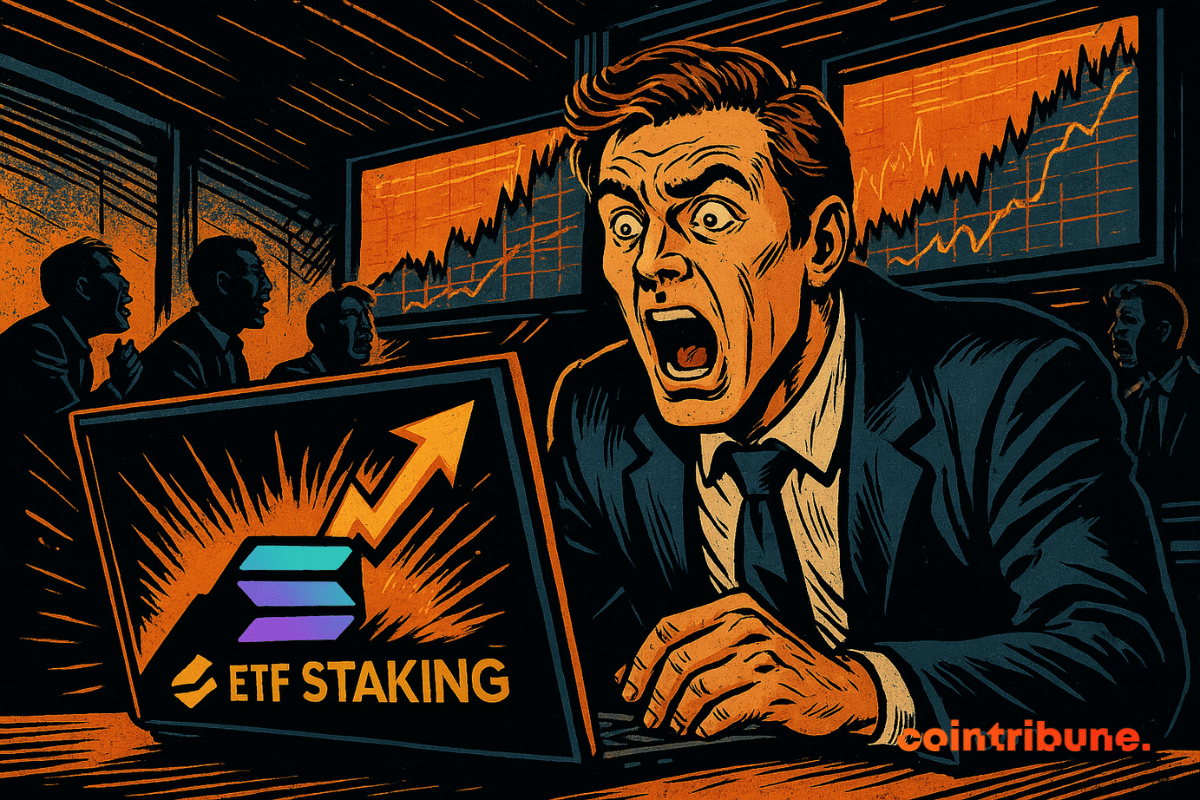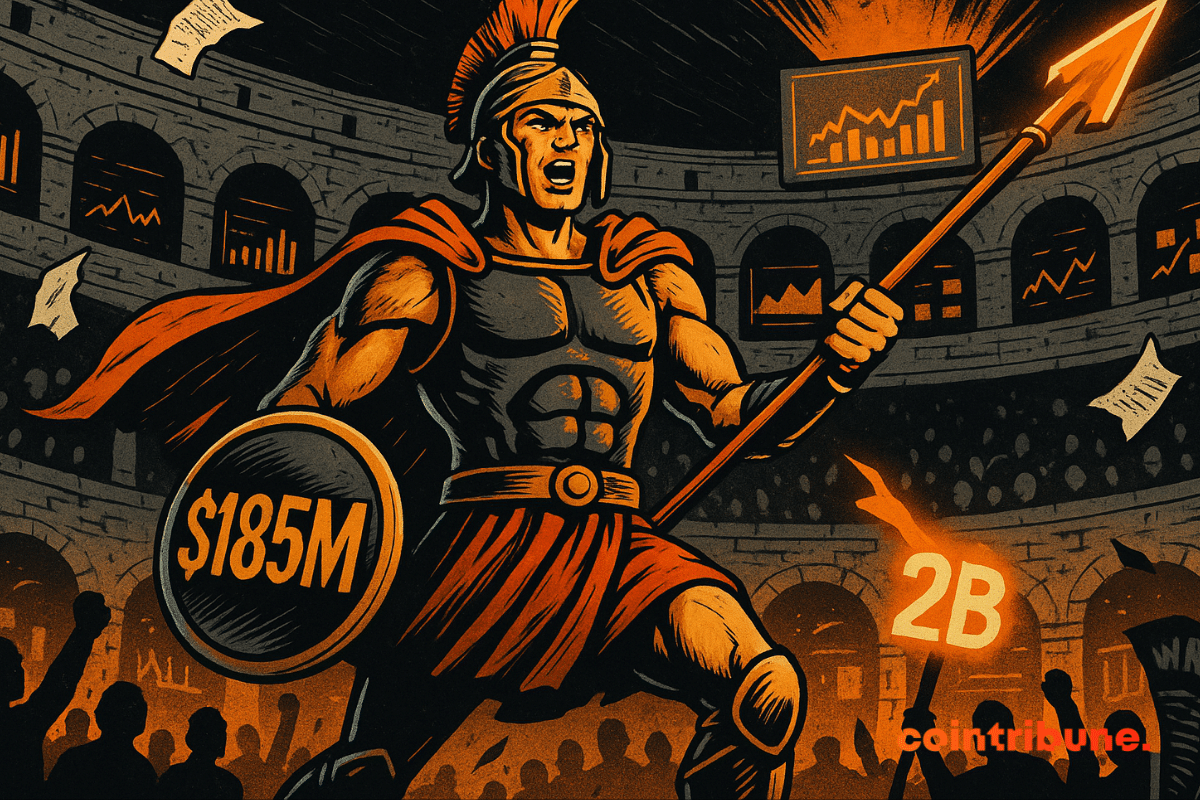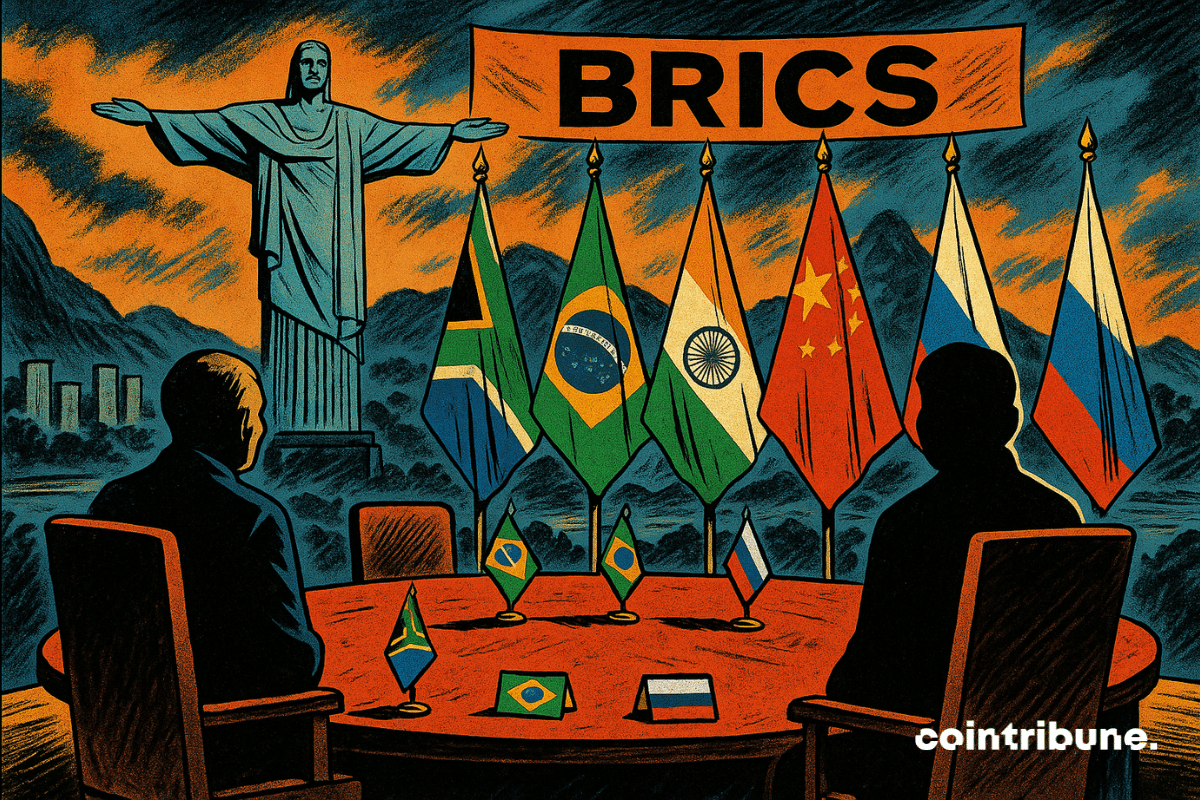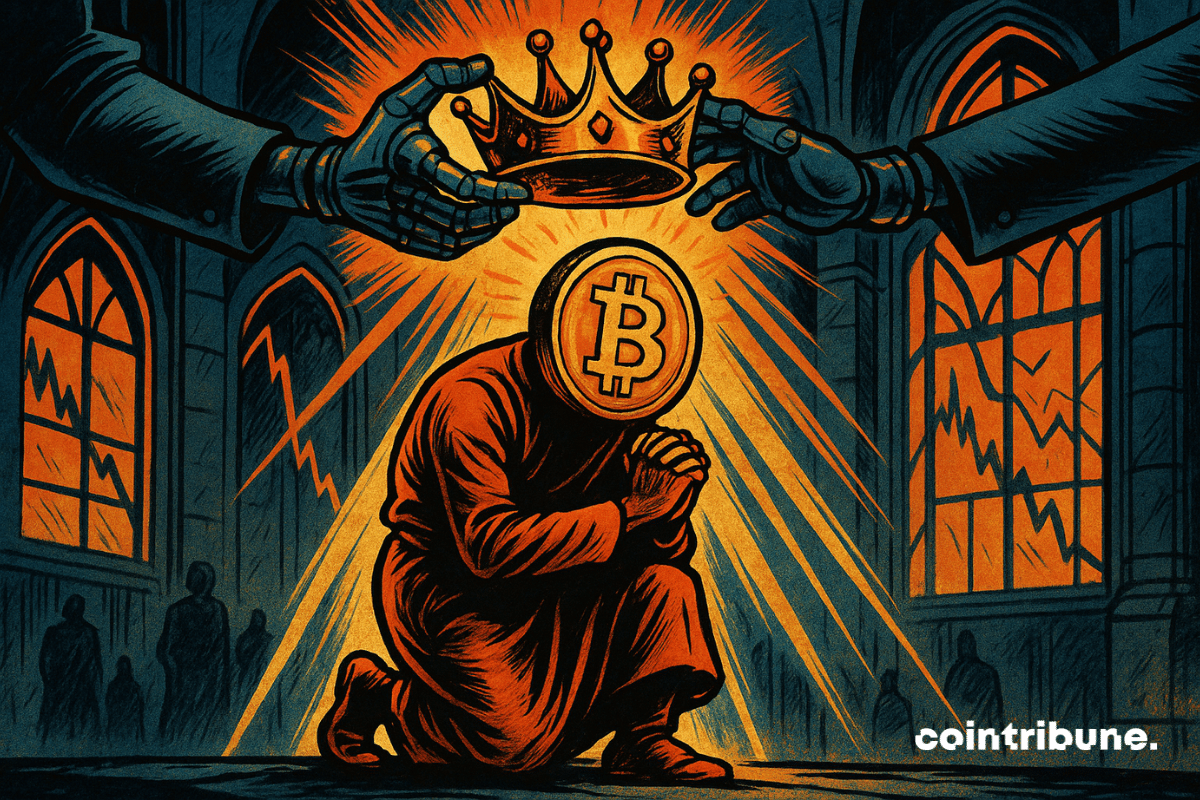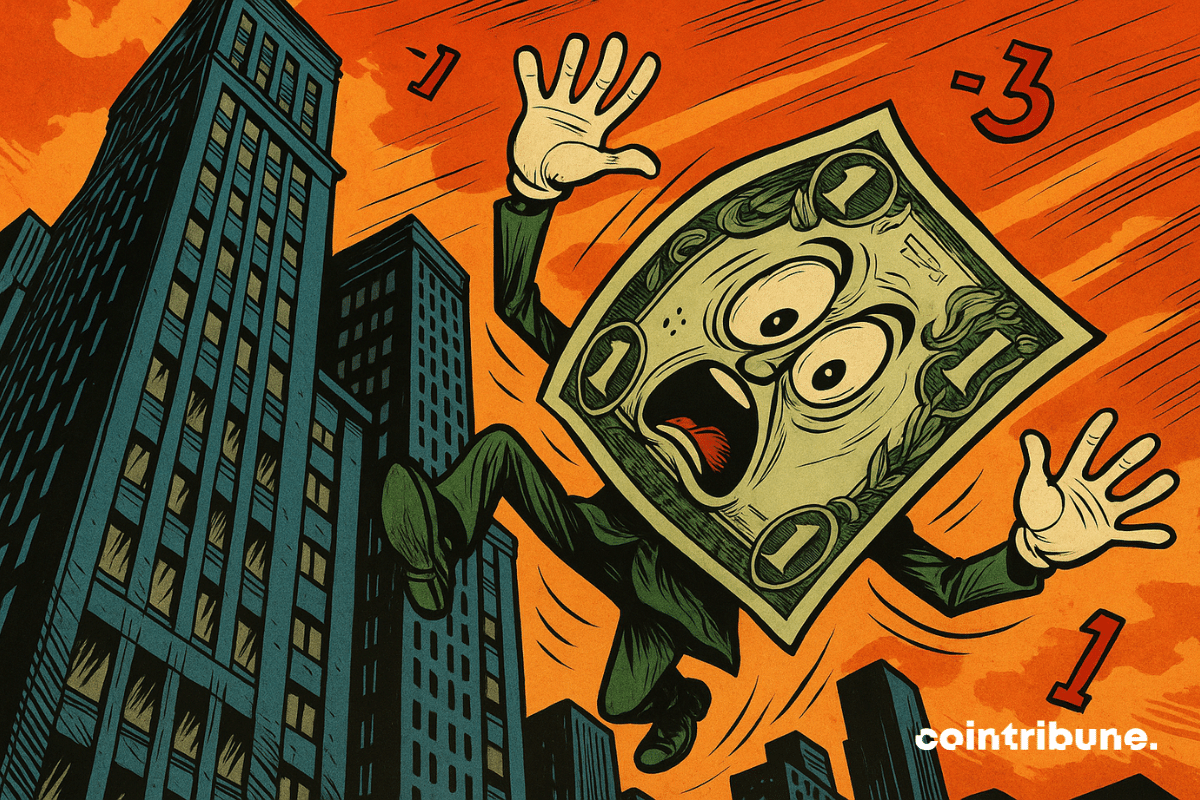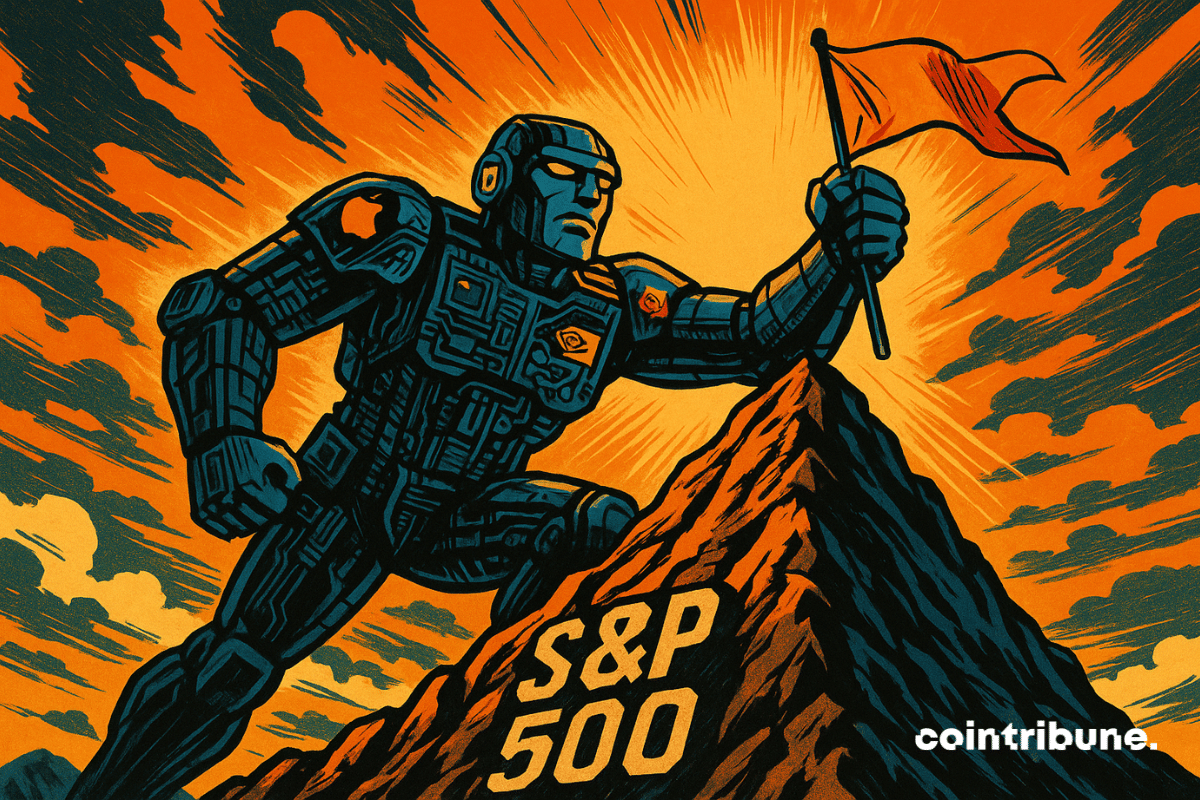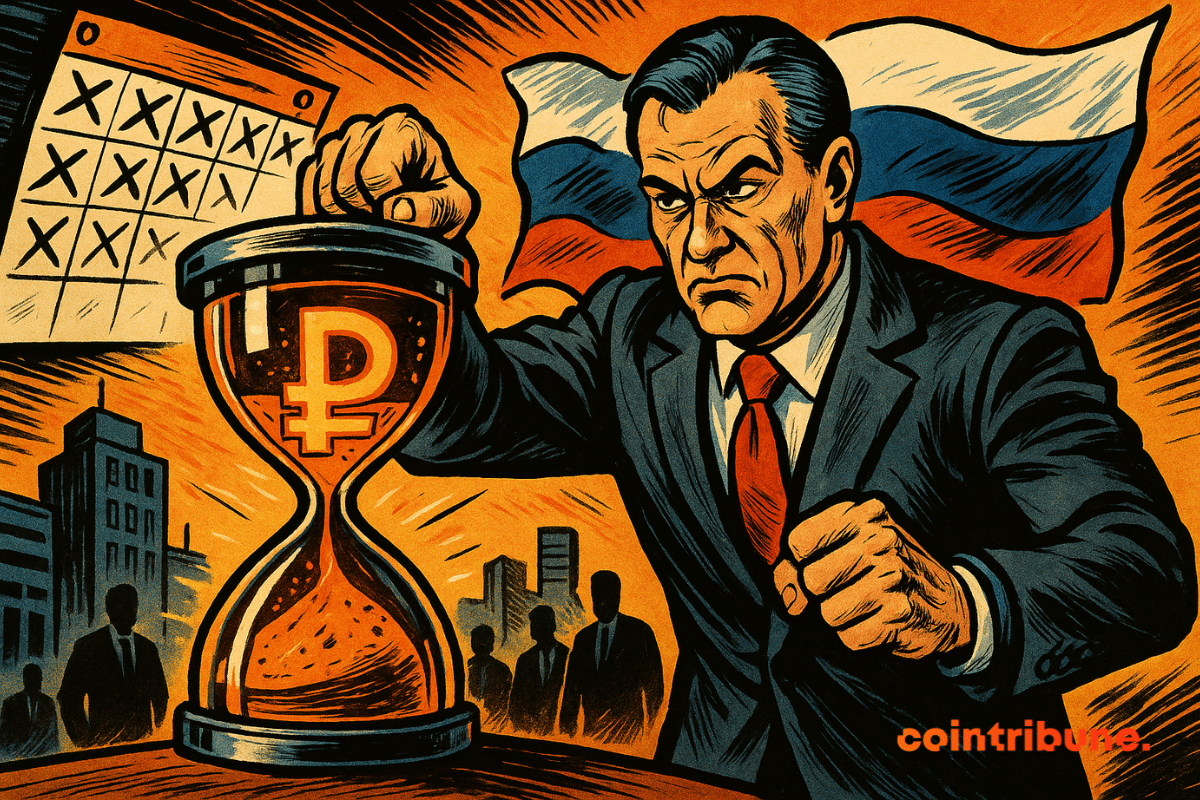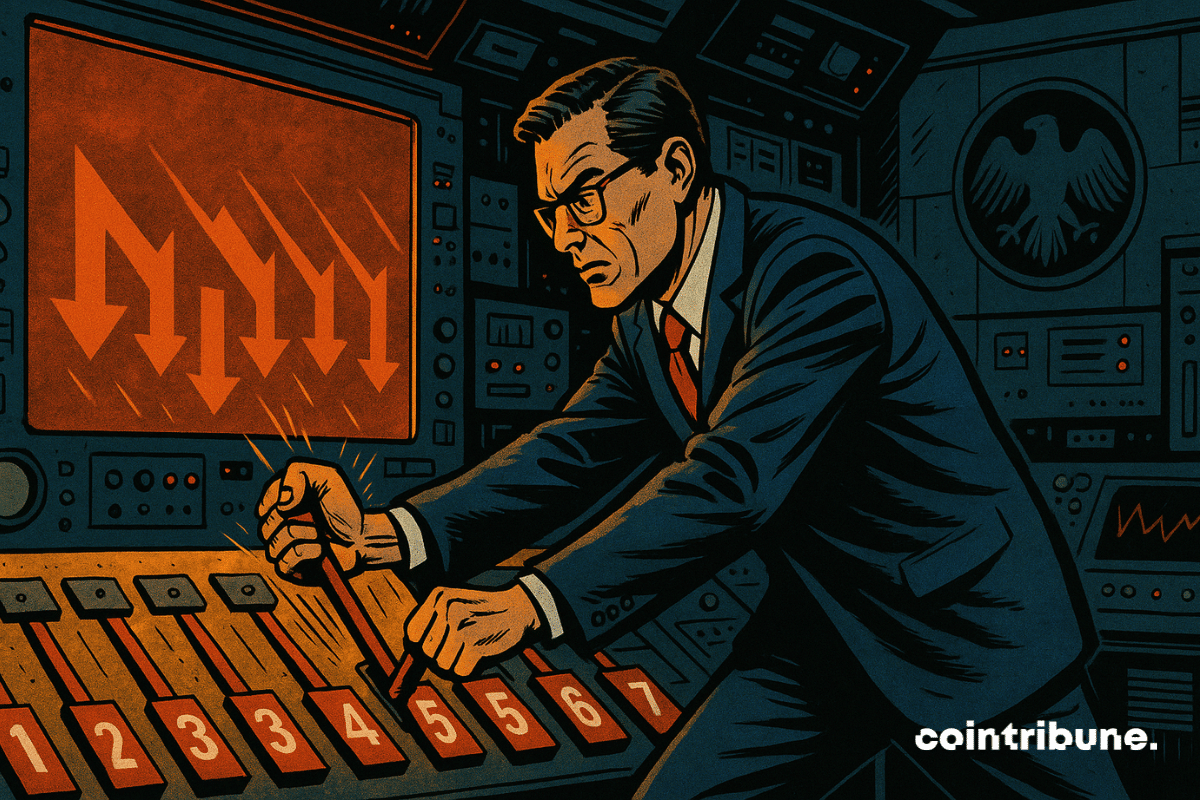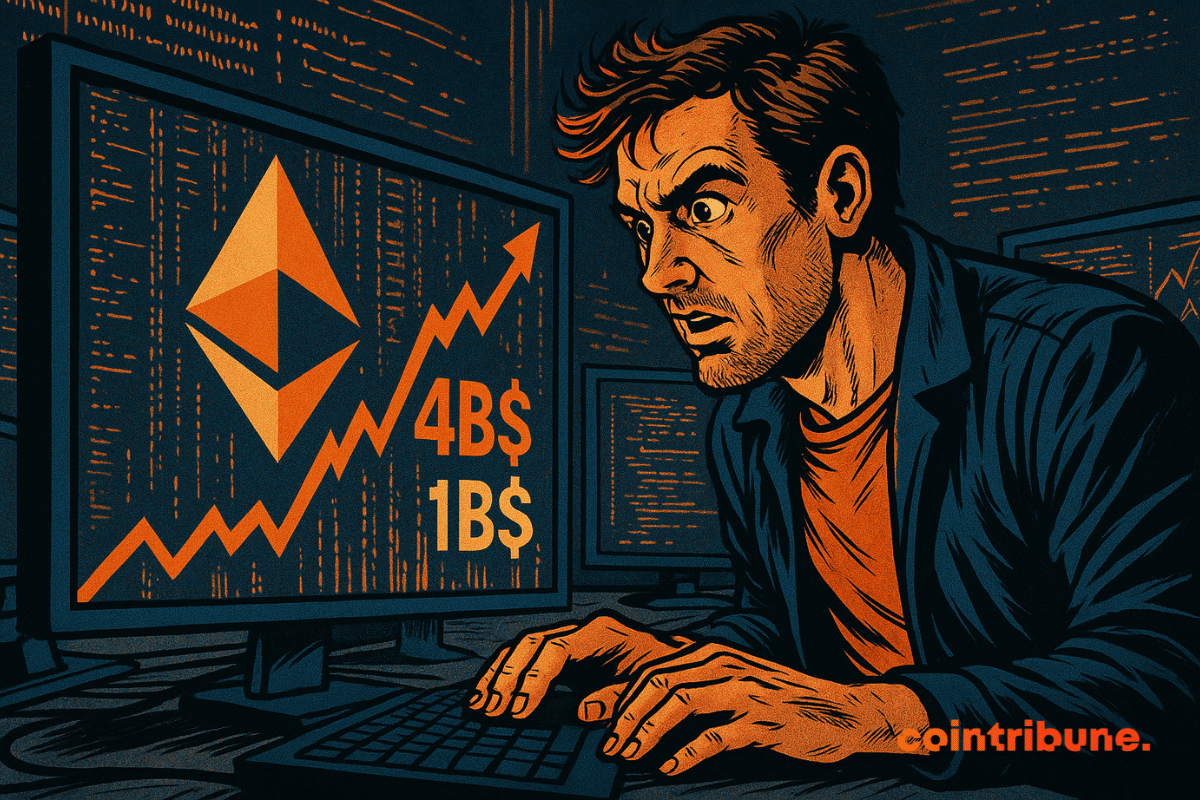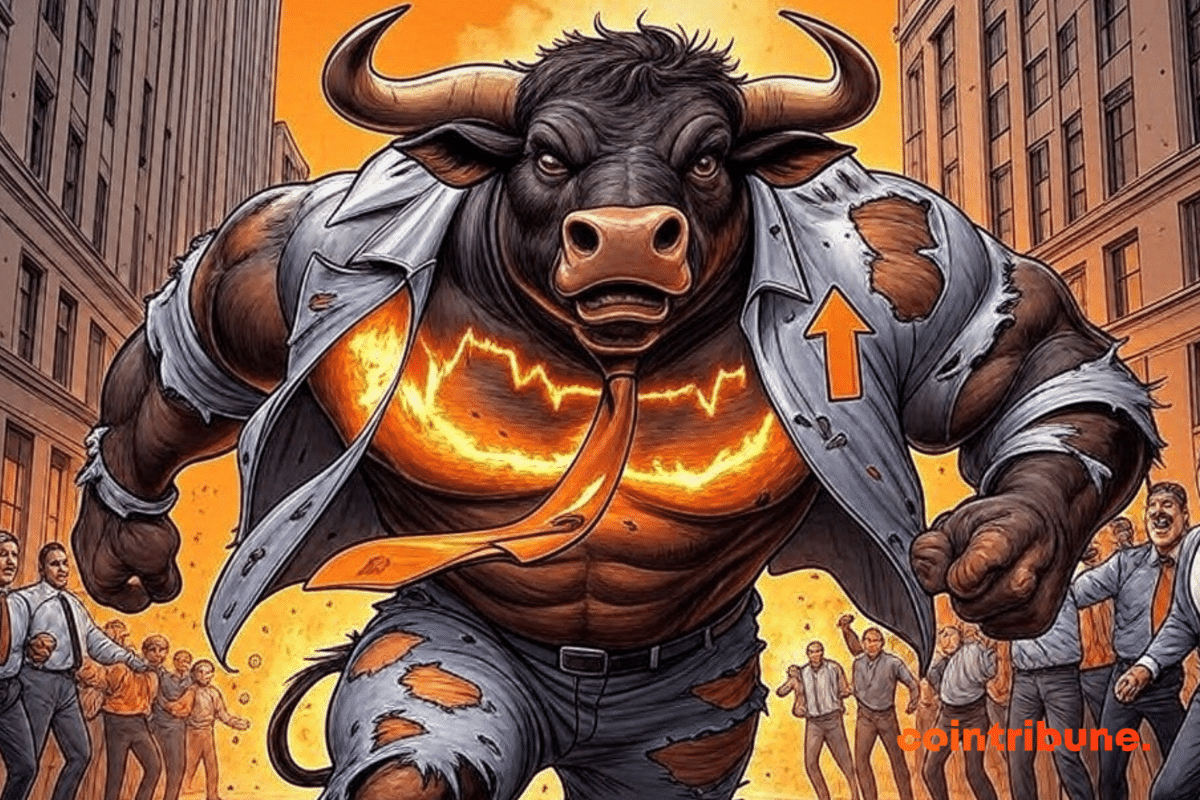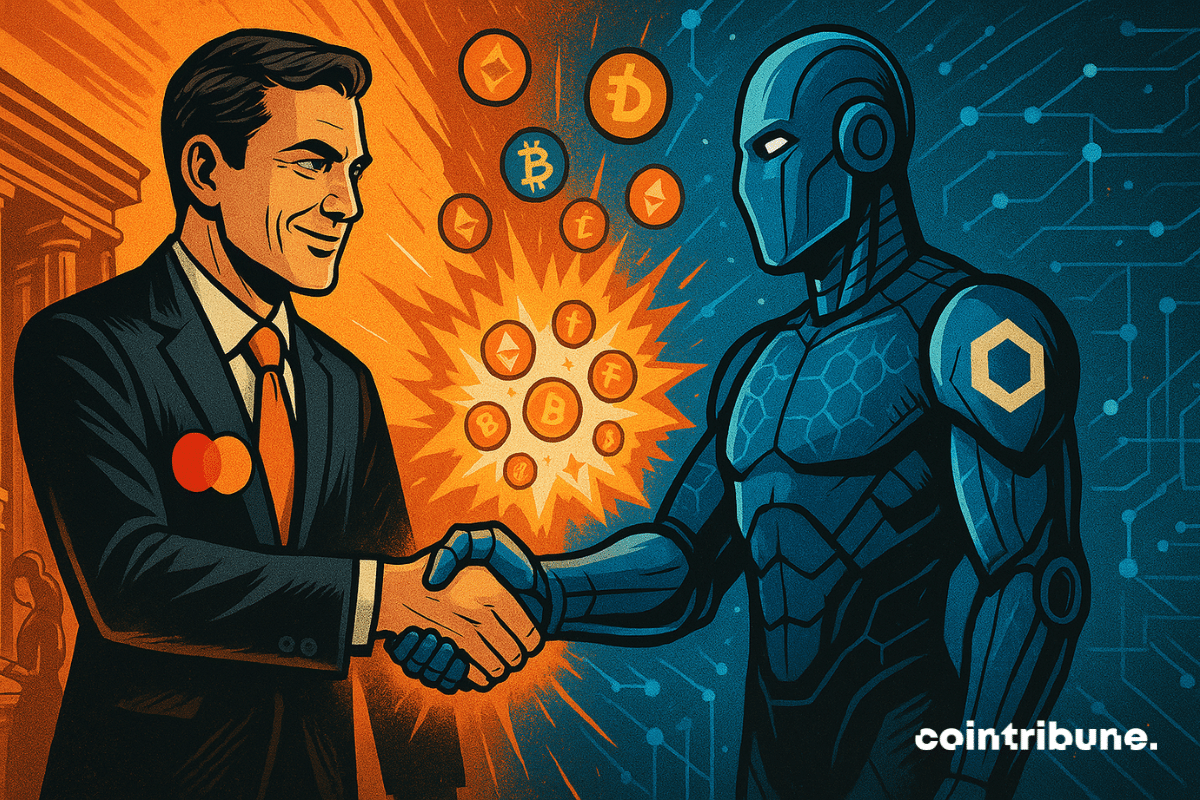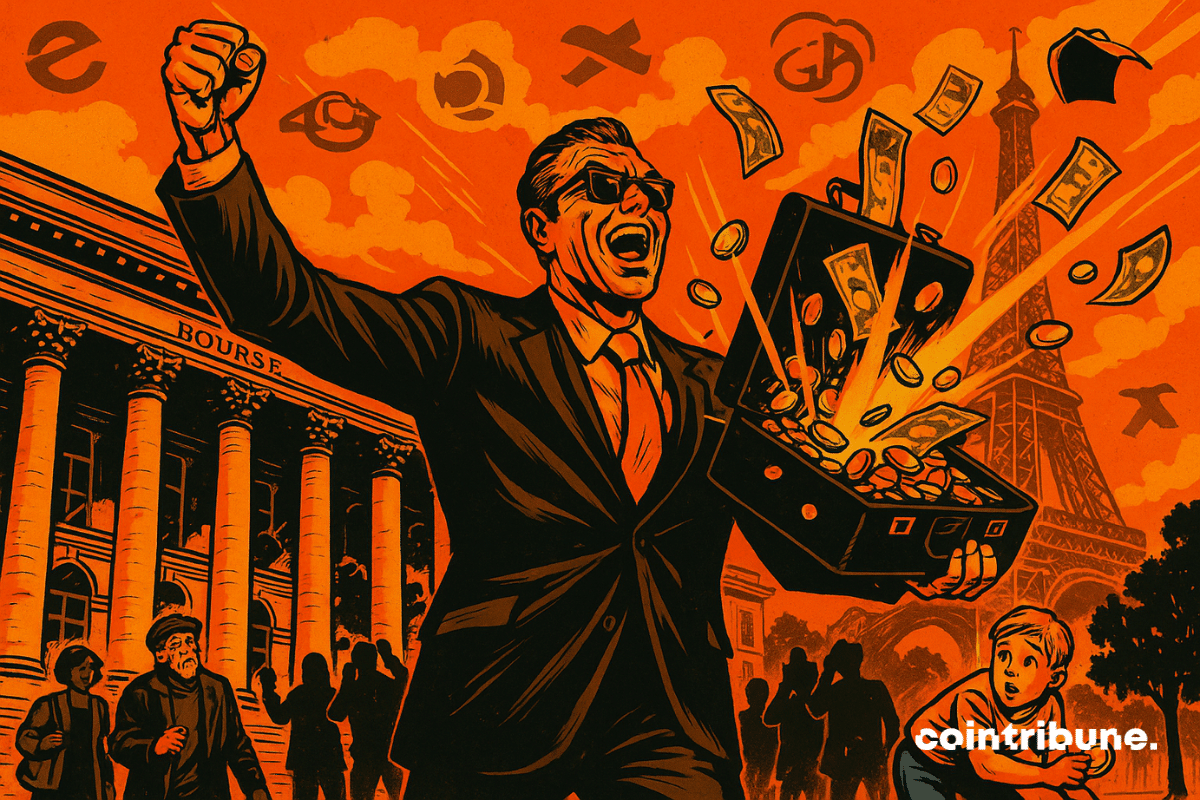France's economy recorded a trade deficit of 7.6 billion euros in May. A concerning trend for investors.
Finance News
Larry Fink endorses bitcoins faster than miners can produce them. While staking is making its appearance, the ETF is turning BTC into a nice, juicy pawn.
When an Asian soup brand turns into a bitcoin vault... DDC buys, cashes in, and starts over: 368 BTC later, the markets are hungry for a new model.
Since the beginning of July, investors have been lending to Italy at a lower rate than that demanded for France. Indeed, the curve has inverted for the first time since 2005, weakening Paris's position in the hierarchy of sovereign risk in the euro area. Yet, France maintains a better rating. This paradox points to a perceptible reality: markets are doubtful. And in this hesitation, alternative assets are gaining ground.
The economy is at risk of a commercial earthquake: the suspended tariffs could come into effect in August. The details here!
The debate on leaving the euro is resurfacing regularly in France. With new presidential elections set for 2027, a victory for the National Rally could lead to an exit from the euro. The French could very well come out of it ruined!
At a time when trade tensions are reshaping global power dynamics, Europe faces a direct threat: Washington has imposed a deadline of July 9 to reach a bilateral agreement. After this date, tariffs of up to 70% would hit European exports starting August 1. In this high-tension climate, Brussels is attempting to avoid a head-on clash with a U.S. administration determined to enforce its rules. An express negotiation is underway to prevent a shift to a tariff confrontation.
The drop in mortgage rates marks an unexpected pause. While the market was beginning to restart, the curves are freezing, diverging from forecasts. This turnaround intrigues both buyers and investors, caught between hopes and uncertainties. Why are rates no longer falling, despite a more flexible monetary context? This blockage raises questions about the financing dynamics in France and reveals deeper tensions, at the very moment when real estate is trying to emerge from its stagnation.
On the eve of July 4th, the U.S. Congress passed one of the most radical budget texts of the modern era. Championed by Donald Trump, this law reshapes America's economic priorities with massive tax cuts, social spending reductions, and a sharply rising debt. The vote, secured despite Republican fractures, marks a strategic turning point in the post-Biden era. More than just a budget, it is a political declaration that reshuffles the cards of power and reignites ideological tensions in Washington.
As the global geopolitical balance weakens, Rio will host a tense BRICS summit on July 6 and 7, 2025. Designed as a counterweight to the G7, the bloc struggles to embody the unity of the global South. Internal disagreements, Xi Jinping's absence, and Donald Trump's offensive comeback: the 17th edition illustrates less of a rise in power than a questioning of the strategic coherence among its members. In an era of multipolar ambitions, the BRICS are facing a crisis of legitimacy as much as a test of international credibility.
While the stock market progresses timidly, it is the dollar that falters, weakened by the dual pressure of the new trade taxes imposed by Donald Trump and the ongoing hesitation of the Federal Reserve. In this tense atmosphere, investors oscillate between the quest for yield and the caution dictated by the surrounding instability. The apparent calm conceals a palpable nervousness: that of a market that knows that everything can tip at the slightest jolt.
At a time when DeFi is reinventing uses through groundbreaking innovations, certain trends are literally exploding. In this technological cacophony, RWA — these tokenized real-world assets — are tracing a stunning trajectory: +260% by 2025, for a market of 23 billion dollars. Behind this figure lies a promise: that of tangible, stable returns, grounded in the real economy. A remedy for crypto volatility, a bridge to the traditional world. "Real yield is the new grail," insiders are already whispering. And at the heart of this rise in power, Credefi is quietly laying out its game.
The BIS stands up to defend the Fed. Can the economy withstand a monetary crisis? The details in this article!
When bitcoin ETFs are making numbers like never before, investors are jigging while Wall Street rediscovers crypto, their eyes fixed on curves that rise steadily.
While the markets hesitate, Saylor is accumulating bitcoins by the thousands. Another 4,980 units? At this rate, it's the FED that will end up calling him.
It's hard to believe, but Donald Trump is favorable to bitcoin becoming the international reserve currency par excellence.
A Solana ETF that stakes, analysts rejoicing, and the SEC saying nothing... Could REX Shares be trying to make crypto dance on the regulatory floor?
Kalshi has raised $185 million in new funding, boosting its valuation to $2 billion as it plans to expand access to its prediction markets and grow its technology team.
Rio is set to host a high-stakes BRICS summit, marked by two historic absences: Xi Jinping and Vladimir Putin. The Chinese president is withdrawing for the first time since 2013, while his Russian counterpart remains in the Kremlin, targeted by an arrest warrant from the ICC. At a time when the bloc wants to assert itself against the dollar and strengthen its influence, these withdrawals weaken the group's unity and raise doubts about its geopolitical trajectory.
Has the crypto casino definitely closed its doors? Probably. There are signs that cannot be mistaken...
While Wall Street sets more records, the dollar is collapsing at an unprecedented rate since 1973. This wide gap is not trivial. It reflects a global shift fueled by geopolitical tensions, a Federal Reserve under political pressure, and macroeconomic uncertainties. The benchmarks are crumbling, and markets are seeking safe havens. In this silent but brutal reconfiguration, cryptocurrencies are once again asserting themselves in the strategic landscape, propelled by their decentralized logic in the face of state currency instability.
"Driven by an unexpected easing in the Middle East and a resurgence of stock market optimism, the S&P 500 closed this Thursday at 6,141.02 points, nearing its all-time high. Increasing by 0.8%, the benchmark index marks a significant rebound since its low in April, despite ongoing uncertainties regarding trade tariffs and regional stability."
Creating an efficient trading bot has long been a hassle. It required a combination of technical expertise, patience, and countless manual attempts. Beginners soon gave up. Even advanced users wasted precious time. With the launch of its AI Agent Optimizer, Runbot is shaking things up. This new conversational assistant turns strategy optimization into a simple exchange with artificial intelligence. No code. No technical lines. Just a clear discussion that leads to more effective strategies.
Russia no longer tests. It imposes. By decreeing the mandatory integration of the digital ruble into the national banking and commercial system, Moscow leaves no room for doubt. The transition to a controlled, programmable, and centralized currency is underway. Gone are the ambiguities of experimentation, making way for the architecture of an unprecedented monetary system where each transaction could, tomorrow, be traced, regulated... or even blocked. This choice is not merely technological: it is political, strategic, almost ideological. For behind the apparent modernization of payments lies a much larger game.
In an economic climate marked by geopolitical tensions and a wait-and-see approach regarding the Fed's decisions, Morgan Stanley disrupts the consensus. The investment bank anticipates seven rate cuts in 2026, starting in March, with a terminal rate between 2.5% and 2.75%. This sharp projection, published on June 25th, contrasts with the prevailing caution and reignites debates about the U.S. monetary calendar.
While Bitcoin struts its stuff, Ethereum is digging its furrow. Discreet but robust ETFs, stealthy rebalances, rock-bottom fees... what if the little brother became the darling of the big wallets?
Bitcoin is gaining altitude, energized by the ceasefire agreement between Iran and Israel. A new high is in sight.
As the lines between traditional finance and blockchain become increasingly blurred, Mastercard and Chainlink are crossing a decisive threshold. In a partnership announced this Tuesday, they unveil a fiat-to-crypto conversion solution directly on-chain, designed for Mastercard cardholders. This initiative, far from being anecdotal, redefines access to cryptocurrencies and lays the groundwork for a new era of hybrid payments between traditional finance and Web3.
Despite a decline in profits, companies in the CAC 40 are increasingly attentive to their shareholders. In 2024, they maintain record payouts, contrary to traditional economic signals. In an environment marked by sluggish growth, rising inflation, and unstable markets, this strategy raises questions. Is it a sign of strength or a risky bet? While shareholder profitability remains a priority, the gap between distributed profits and actual performance raises doubts about the sustainability of this model.
Donald Trump's surprise announcement of a ceasefire between Iran and Israel has caused a real earthquake in the energy markets. Oil prices plunged by more than 5%, while global stock markets soared. Is this geopolitical calm sustainable?
